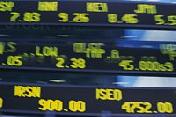
 |
|
| Financial Terms | |
| Temporary Difference |
|
Information about financial, finance, business, accounting, payroll, inventory, investment, money, inventory control, stock trading, financial advisor, tax advisor, credit.
Main Page: finance, credit, tax advisor, stock trading, inventory, accounting, payroll, money, |
Definition of Temporary Difference
Temporary DifferenceA difference between pretax book income and taxable income that
Related Terms:Deferred Income Tax ExpenseThat portion of the total income tax provision that is the result Deferred Tax AssetFuture tax benefit that results from (1) the origination of a temporary difference Difference from S&PA mutual fund's return minus the change in the Standard & Poors 500 Index for the Indifference curveThe graphical expression of a utility function, where the horizontal axis measures risk and Temporary accountsThe accounts found on the Income Statement and the Statement of Retained Earnings; these accounts are reduced to zero at the end of every accounting period. Other-than-Temporary Decline in Market ValueThe standard used to describe a decline in market value that is not expected to recover. The use of the other-than-temporary description as Temporary Life Insurancetemporary insurance coverage is available at time of application for a life insurance policy if certain conditions are met. Normally, temporary coverage relates to free coverage while the insurance company which is underwriting the risk, goes through the process of deciding whether or not they will grant a contract of coverage. The qualifications for temporary coverage vary from insurance company to insurance company but generally applicants will qualify if they are between the ages of 18 and 65, have no knowledge or suspicions of ill health, have not been absent from work for more than 7 days within the prior 6 months because of sickness or injury and total coverage applied for from all sources does not exceed $500,000. Normally a cheque covering a minimum of one months premium is required to complete the conditions for this kind of coverage. The insurance company applies this deposit towards the cost of a policy at its issue date, which may be several weeks in the future.  Deferred Tax LiabilityFuture tax obligation that results from the origination of a temporary Acquisition of assetsA merger or consolidation in which an acquirer purchases the selling firm's assets. After-tax profit marginThe ratio of net income to net sales. After-tax real rate of returnMoney after-tax rate of return minus the inflation rate. Annual fund operating expensesFor investment companies, the management fee and "other expenses," AssetAny possession that has value in an exchange. Asset/equity ratioThe ratio of total assets to stockholder equity. Asset/liability managementAlso called surplus management, the task of managing funds of a financial Asset activity ratiosRatios that measure how effectively the firm is managing its assets.  Asset allocation decisionThe decision regarding how an institution's funds should be distributed among the Asset-backed securityA security that is collateralized by loans, leases, receivables, or installment contracts Asset-based financingMethods of financing in which lenders and equity investors look principally to the Asset classesCategories of assets, such as stocks, bonds, real estate and foreign securities. Asset-coverage testA bond indenture restriction that permits additional borrowing on if the ratio of assets to Asset for asset swapCreditors exchange the debt of one defaulting borrower for the debt of another Asset pricing modelA model for determining the required rate of return on an asset. Asset substitutionA firm's investing in assets that are riskier than those that the debtholders expected. Asset substitution problemArises when the stockholders substitute riskier assets for the firm's existing Asset swapAn interest rate swap used to alter the cash flow characteristics of an institution's assets so as to Asset turnoverThe ratio of net sales to total assets.  Asset pricing modelA model, such as the Capital asset Pricing Model (CAPM), that determines the required AssetsA firm's productive resources. Assets requirementsA common element of a financial plan that describes projected capital spending and the Asymmetric taxesA situation wherein participants in a transaction have different net tax rates. Average tax ratetaxes as a fraction of income; total taxes divided by total taxable income. Before-tax profit marginThe ratio of net income before taxes to net sales. Break-even tax rateThe tax rate at which a party to a prospective transaction is indifferent between entering Capital asset pricing model (CAPM)An economic theory that describes the relationship between risk and Cash flow after interest and taxesNet income plus depreciation. Contingent deferred sales charge (CDSC)The formal name for the load of a back-end load fund. Corporate tax viewThe argument that double (corporate and individual) taxation of equity returns makes Corporate taxable equivalentRate of return required on a par bond to produce the same after-tax yield to Current assetsValue of cash, accounts receivable, inventories, marketable securities and other assets that Deferred callA provision that prohibits the company from calling the bond before a certain date. During this Deferred equityA common term for convertible bonds because of their equity component and the Deferred futuresThe most distant months of a futures contract. A bond that sells at a discount and does not Deferred nominal life annuityA monthly fixed-dollar payment beginning at retirement age. It is nominal Deferred taxesA non-cash expense that provides a source of free cash flow. Amount allocated during the Deferred-annuitiestax-advantaged life insurance product. deferred annuities offer deferral of taxes with the Depreciation tax shieldThe value of the tax write-off on depreciation of plant and equipment. Double-tax agreementAgreement between two countries that taxes paid abroad can be offset against Dynamic asset allocationAn asset allocation strategy in which the asset mix is mechanistically shifted in Earnings before interest and taxes (EBIT)A financial measure defined as revenues less cost of goods sold Economic incomeCash flow plus change in present value. Equivalent taxable yieldThe yield that must be offered on a taxable bond issue to give the same after-tax Exchange of assetsAcquisition of another company by purchase of its assets in exchange for cash or stock. Expense ratioThe percentage of the assets that were spent to run a mutual fund (as of the last annual ExpensedCharged to an expense account, fully reducing reported profit of that year, as is appropriate for Financial assetsClaims on real assets. Fixed assetLong-lived property owned by a firm that is used by a firm in the production of its income. Fixed asset turnover ratioThe ratio of sales to fixed assets. Fixed-income equivalentAlso called a busted convertible, a convertible security that is trading like a straight Fixed-income instrumentsassets that pay a fixed-dollar amount, such as bonds and preferred stock. Fixed-income marketThe market for trading bonds and preferred stock. Foreign tax creditHome country credit against domestic income tax for foreign taxes paid on foreign Imputation tax systemArrangement by which investors who receive a dividend also receive a tax credit for Income beneficiaryOne who receives income from a trust. Income bondA bond on which the payment of interest is contingent on sufficient earnings. These bonds are Income fundA mutual fund providing for liberal current income from investments. Income statement (statement of operations)A statement showing the revenues, expenses, and income (the Income stockCommon stock with a high dividend yield and few profitable investment opportunities. Intangible assetA legal claim to some future benefit, typically a claim to future cash. Goodwill, intellectual Interest equalization taxtax on foreign investment by residents of the U.S. which was abolished in 1974. Interest tax shieldThe reduction in income taxes that results from the tax-deductibility of interest payments. Investment incomeThe revenue from a portfolio of invested assets. Investment tax creditProportion of new capital investment that can be used to reduce a company's tax bill Limited-tax general obligation bondA general obligation bond that is limited as to revenue sources. Liquid assetasset that is easily and cheaply turned into cash - notably cash itself and short-term securities. Long-term assetsValue of property, equipment and other capital assets minus the depreciation. This is an Limitation on asset dispositionsA bond covenant that restricts in some way a firm's ability to sell major assets. Marginal tax rateThe tax rate that would have to be paid on any additional dollars of taxable income earned. Monthly income preferred security (MIP)Preferred stock issued by a subsidiary located in a tax haven. Net asset value (NAV)The value of a fund's investments. For a mutual fund, the net asset value per share Net assetsThe difference between total assets on the one hand and current liabilities and noncapitalized longterm Net incomeThe company's total earnings, reflecting revenues adjusted for costs of doing business, Non-reproducible assetsA tangible asset with unique physical properties, like a parcel of land, a mine, or a Other current assetsValue of non-cash assets, including prepaid expenses and accounts receivable, due Personal tax view (of capital structure)The argument that the difference in personal tax rates between Policy asset allocationA long-term asset allocation method, in which the investor seeks to assess an Progressive tax systemA tax system wherein the average tax rate increases for some increases in income but Publicly traded assetsassets that can be traded in a public market, such as the stock market. Quick assetsCurrent assets minus inventories. Real assetsIdentifiable assets, such as buildings, equipment, patents, and trademarks, as distinguished from a Reproducible assetsA tangible asset with physical properties that can be reproduced, such as a building or Residual assetsassets that remain after sufficient assets are dedicated to meet all senior debtholder's claims in full. Return on assets (ROA)Indicator of profitability. Determined by dividing net income for the past 12 months Return on total assetsThe ratio of earnings available to common stockholders to total assets. Riskless or risk-free assetAn asset whose future return is known today with certainty. The risk free asset is Risky assetAn asset whose future return is uncertain. Risk-free assetAn asset whose future return is known today with certainty. Short-term tax exemptsShort-term securities issued by states, municipalities, local housing agencies, and Single-premium deferred annuityAn insurance policy bought by the sponsor of a pension plan for a single Split-rate tax systemA tax system that taxes retained earnings at a higher rate than earnings that are Spread incomeAlso called margin income, the difference between income and cost. For a depository Tactical Asset Allocation (TAA)An asset allocation strategy that allows active departures from the normal TANs (tax anticipation notes)tax anticipation notes issued by states or municipalities to finance current Tangible assetAn asset whose value depends on particular physical properties. These i nclude reproducible Tax anticipation bills (TABs)Special bills that the Treasury occasionally issues that mature on corporate Tax booksSet of books kept by a firm's management for the IRS that follows IRS rules. The stockholder's Tax clawback agreementAn agreement to contribute as equity to a project the value of all previously Tax differential view ( of dividend policy)The view that shareholders prefer capital gains over dividends, Related to : financial, finance, business, accounting, payroll, inventory, investment, money, inventory control, stock trading, financial advisor, tax advisor, credit. |